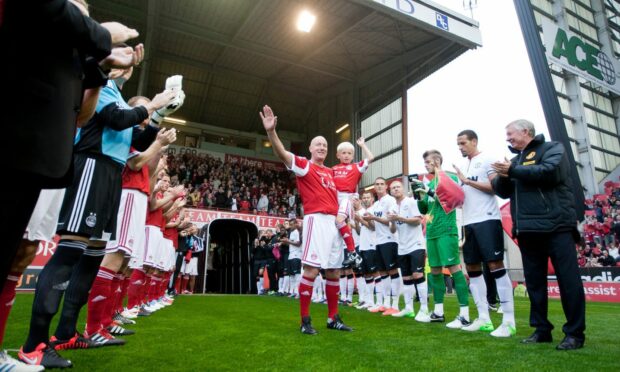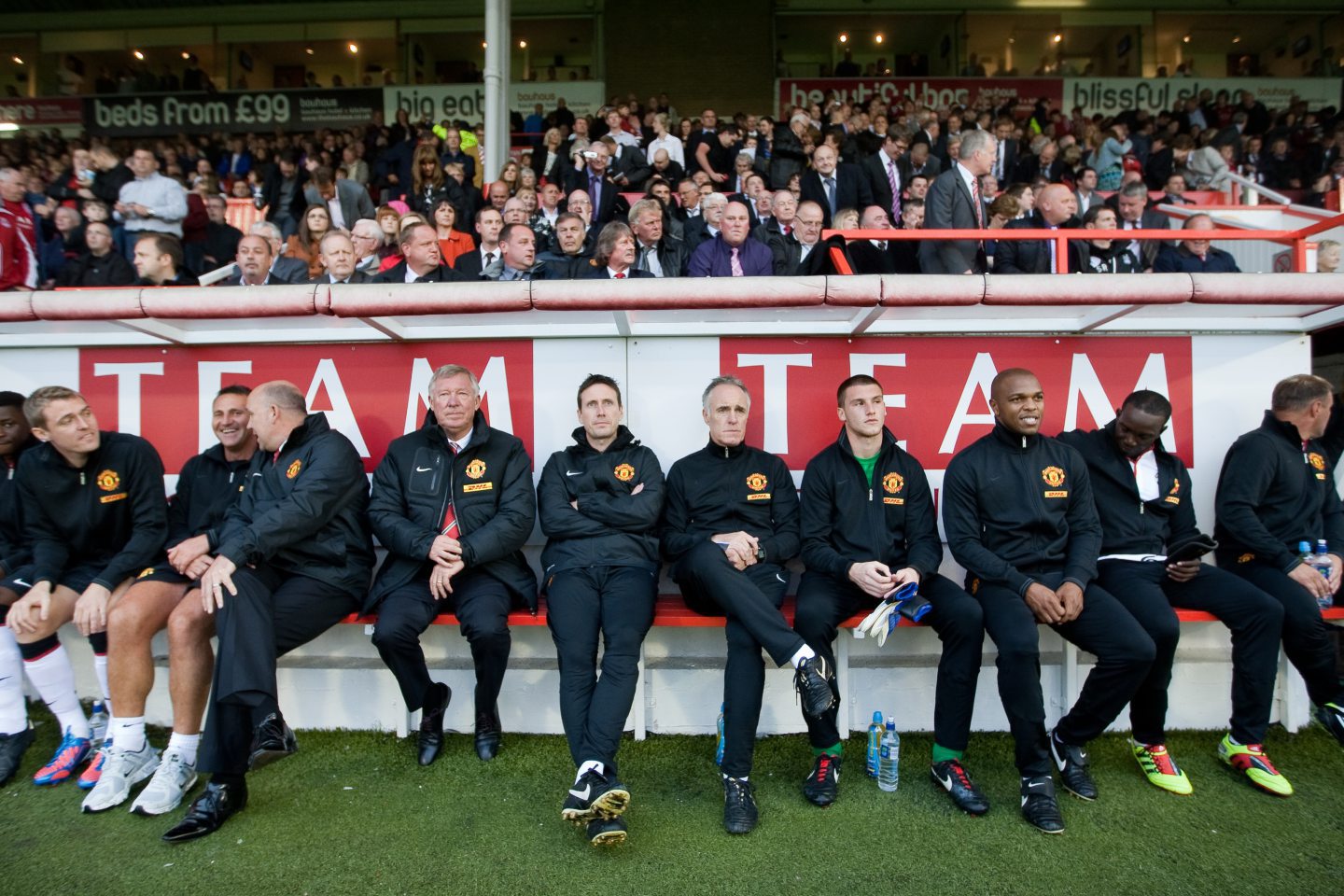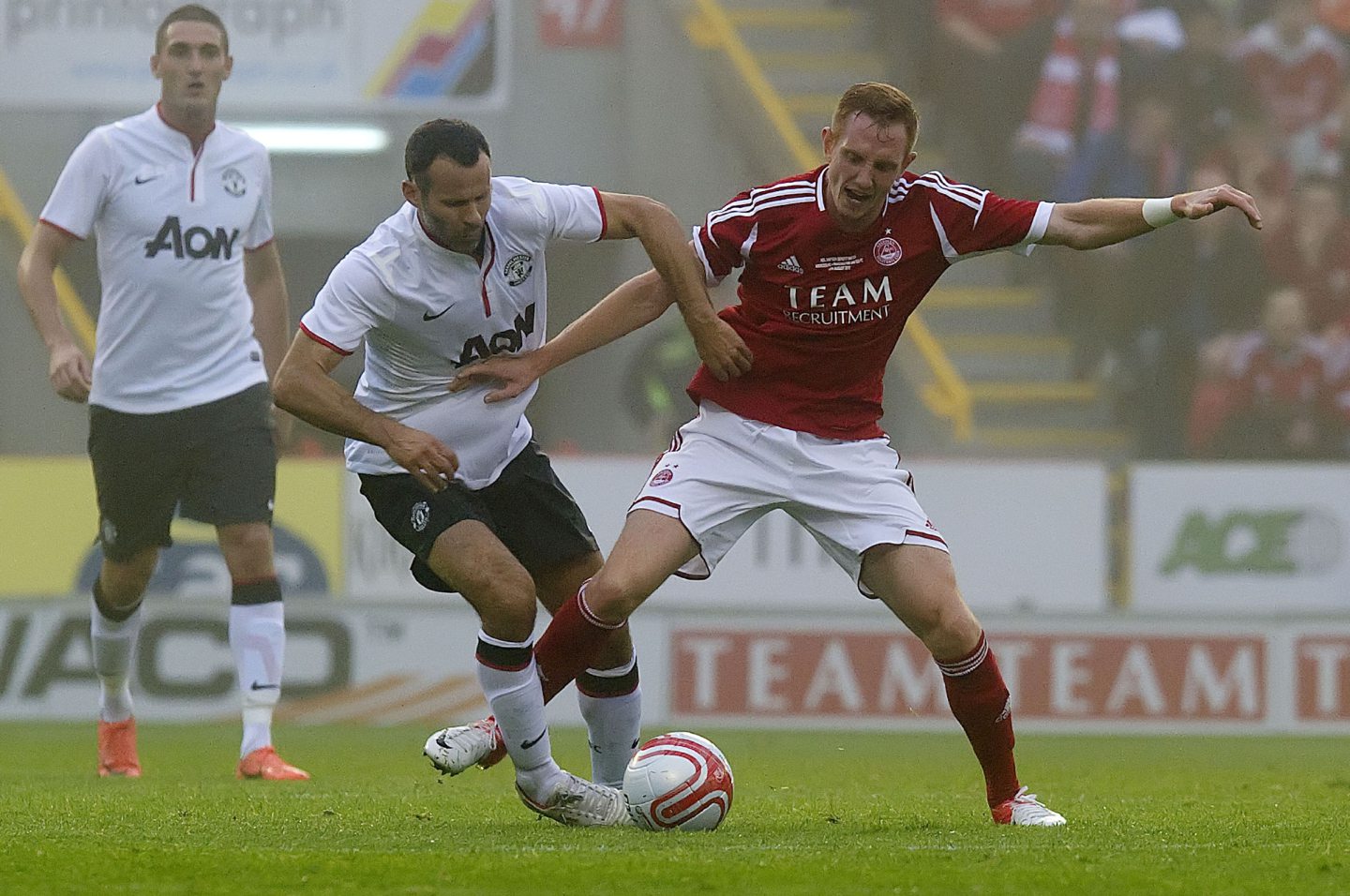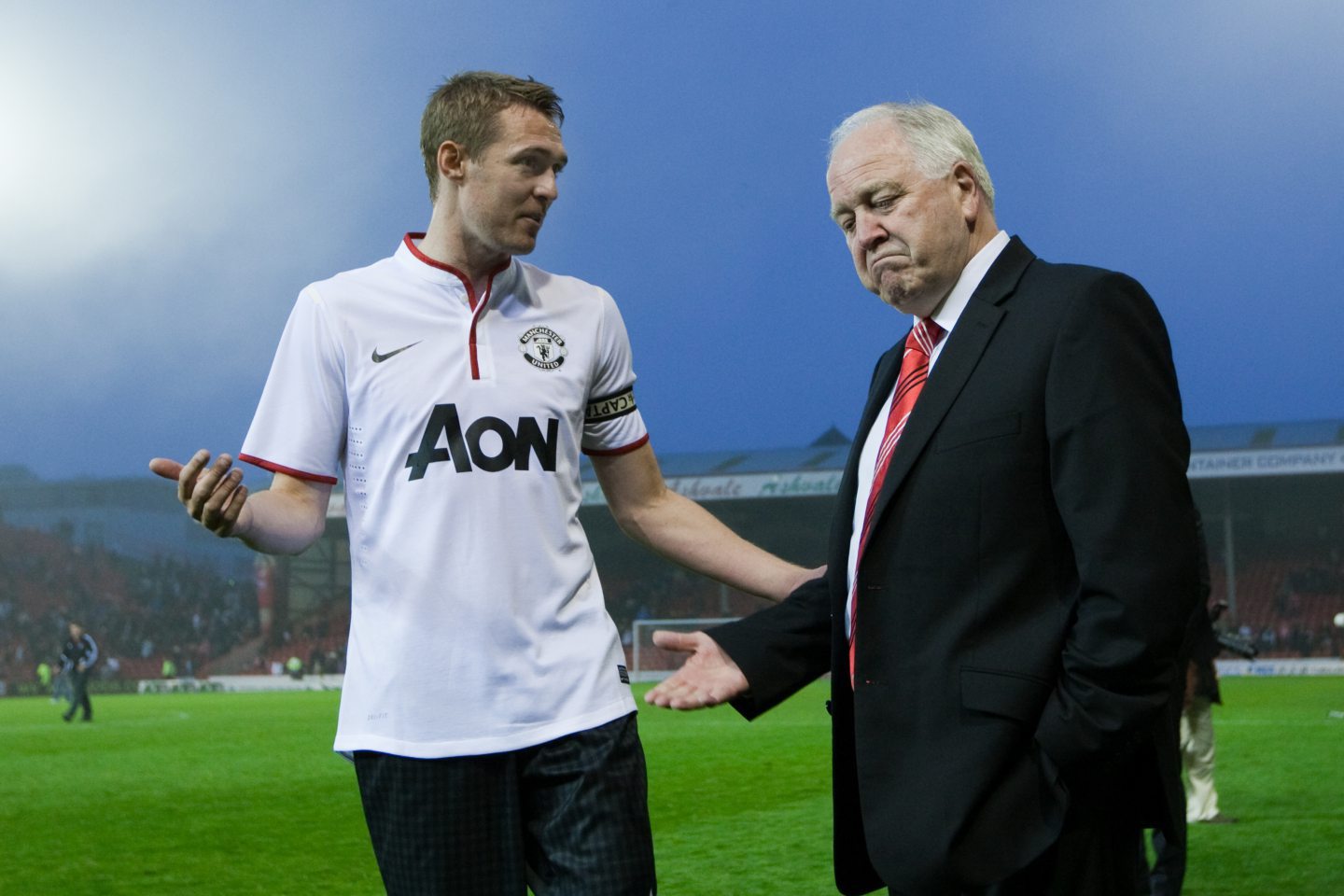Not many footballers have been granted a testimonial after reaching their 50th birthday, let alone been offered the opportunity to take the field against the giants of Manchester United at Pittodrie.
Yet it was a measure of the respect in which Alex Ferguson held Neil Simpson that he brought a star-studded line-up to Pittodrie 10 years this week to celebrate the decades of service which the former Gothenburg Great had offered the Pittodrie club.
It was the sort of showpiece occasion which merited – and received – a packed stadium and while many fans bemoaned the slough of despond into which the Dons had sunk since their glory days in the 1980s, they were never going to turn their backs on a tussle of this magnitude and the chance to pay homage to their esteemed “Simmy”.
And, even as the contest beckoned, there was another positive note when it was confirmed that Scotland internationalist, Darren Fletcher, had recovered from serious illness and was available to make an appearance in the north east of Scotland.
In the build-up to the match, Ferguson spoke warmly about his former player and revealed that he had stayed in touch with Simpson after moving to Manchester in 1986.
The terms which he employed epitomised the qualities which the redoubtable Don always brought to Aberdeen during his illustrious career, culminating, of course, in the capture of the Cup-Winners’ Cup on the famous night in Gothenburg in 1983.
He said: “Neil was one of my first signings and he was totally committed and a serious competitor with a great engine. He was a nice boy, very quiet and unassuming [off the pitch], and he always kept his feet on the ground. I am surprised that he didn’t get a testimonial before now, but he is still working for the club.
“He has been down at Old Trafford a few times during the last year and I know that he is serious about working as a youth coach at Pittodrie and doing it as well as he can. That sums the man up: if he takes something on, he will always give it 100%.”
Often enough, these testimonial fixtures are the catalyst for an outbreak of nostalgia. And that was certainly the case in 2012 as the Press and Journal reflected on the close camaraderie between Ferguson and those he had spurred on to glory.
But there was also a sense of Aberdeen fretting over their dearth of achievements and tangible trophies, which was analytically summed up by John Hewitt, a close buddy of Simpson, and the man who famously sealed their European Cup-Winners Cup triumph.
Just a few days before Man Utd’s visit to the Granite City, he said: “Neil has worked hard, on and off the pitch throughout his career, and he is doing a fine job in a coaching capacity [as head of the Pittodrie youth academy], so he deserves this benefit game.
“It doesn’t feel like nearly 30 years since we won the Cup-Winners’ Cup, but the way things have gone, we will probably be the last Scottish club ever to lift a European trophy. Our football is in a sad state at the moment and, while you have to hope the situation changes for the better, it will take a lot of fixing.
“The one positive aspect of teams struggling financially is they are returning to youth development and bringing through their own talent and that is an area where a Neil Simpson can make a serious contribution to helping turn things around at Pittodrie.”
There hadn’t been much to cheer about in recent times. Hence the Aberdeen supporters were determined they would enjoy themselves at Pittodrie on August 14.
And there was more than one feel-good factor once the action commenced.
Nobody could criticise the quality of the squad chosen by Ferguson, which included international stalwarts of the calibre of Rio Ferdinand, David De Gea, Paul Scholes, Ryan Giggs, Dwight Yorke, Quinton Fortune and Brazilian luminary Anderson.
But it was Fletcher’s name which sparked the most positivity, given that the former Scotland captain, who had been diagnosed with a chronic inflammatory bowel condition, hadn’t played for the club since November of the previous year.
Ferguson said in advance: “It has been quiet progress for the boy. He joined us in training a couple of weeks ago and it was one of those situations where you think: ‘Let’s see how he does, because he has had a really difficult time in the last year’.
“But he has got to the stage now where he needs a match. I let him join Scotland this week, but he wanted a game so I said: “Come to Aberdeen and join up afterwards”.
On a warm summer’s day, Simpson was given a rousing reception by the sell-out crowd as he kicked the match off before being replaced by Stephen Hughes with less than 30 seconds on the clock. And the embrace he was given by Ferguson told its own story.
But while the home aficionados were also treated to a trip down memory lane with Brian Irvine, Dougie Bell and Doug Rougvie all donning Aberdeen shirts again, the hosts were hellbent on demonstrating they weren’t just making up the numbers.
They struggled in the early stages, but gradually carved out a few openings and exposed failings in the United rear guard.
None of which was more evident than when Scholes got himself into an almighty fankle inside his own penalty box, was dispossessed by Jonny Hayes, and the striker slotted the ball past De Gea in the 38th minute.
As the P&J reported: “Fletcher was introduced just before the half-hour mark to a very warm reception from the Pittodrie crowd, but Aberdeen doubled their lead in the 70th minute when Joe Shaughnessy turned the ball home from an Andrew Considine pass after United’s defence was again punished for failing to deal with a Rob Milsom corner.
“Yorke pushed forward and had an effort ruled out for offside, before Anderson pulled a goal back for United with a terrific piece of individual magic after 81 minutes.
“And although their opponents pushed hard for an equaliser in the closing stages, Aberdeen managed to hold on for a surprise victory against the English Premier League giants and the crowd showed their delight with a raucous ovation at the finish.”
It’s not often in football that everybody ends up with a warm glow. But this was one of those instances where the throng had been transported back to a better time.
Jock Gardiner, a tireless member of the AFC Heritage Trust, was one of the organisers of the testimonial and he has revealed how the United squad wound up staying in Aberdeen a little longer than they had been anticipating.
He said: “Their chartered flight didn’t manage to leave Aberdeen that night due to the haar in the region and so they made their own way back to Manchester the next day and did not charge the testimonial committee a penny for any of the added costs.
“There was also a great reception for Darren Fletcher from the Pittodrie crowd and, after the match, Fletch was so appreciative of the supporters for singing his name that he stayed behind for what seemed an hour signing autographs.
“It was a wonderful occasion to honour a fantastic Aberdeen player and club servant.”
More like this:
The forgotten story of how Dutch maestro Johan Cruyff almost played for Aberdeen
When Jimmy Greaves almost played for Aberdeen under Alex Ferguson






Conversation